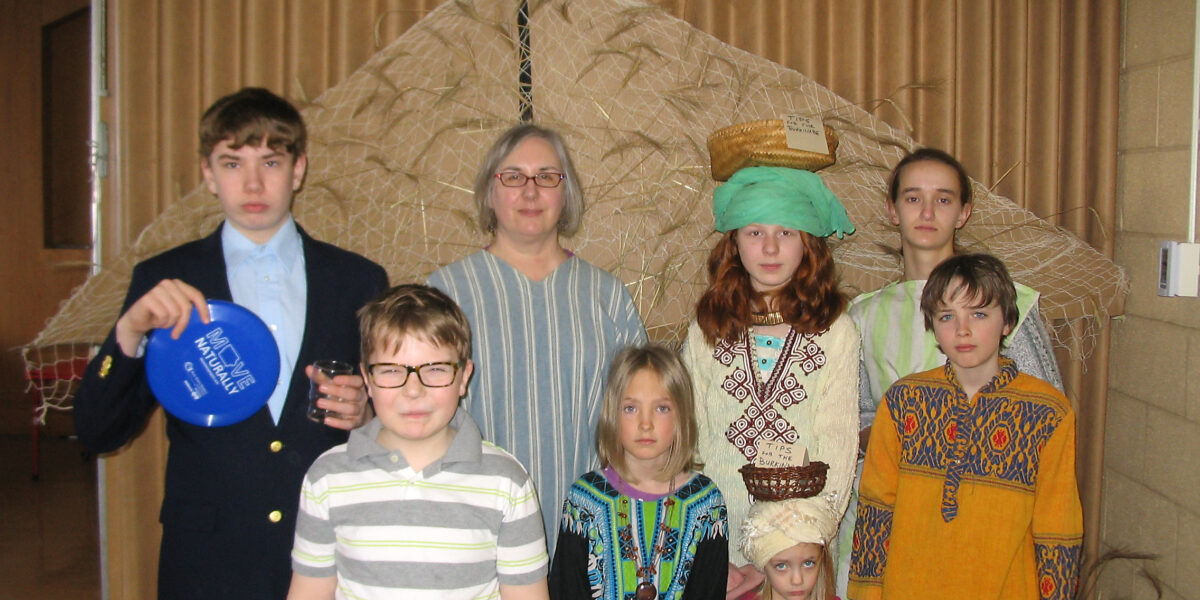ELKHART, Ind. (Mennonite Mission Network) – Laurel Rudd was on a search for a children’s curriculum for mission-focused, stewardship education — and lots of activities. She found Mennonite Mission Network’s mission bank teaching tools and the start of a churchwide tradition.
Rudd has organized mission bank activities at Cedar Falls (Iowa) Mennonite Church since 2006. Starting in January, all the children gather for a four- to six-week break from the normal Sunday school classes. Together, they learn about and join in God’s mission. Mission bank tools also teach children stewardship as they raise funds for mission.
“Our church really wants our kids to know about mission work and what Mennonites are doing in the rest of the world,” Rudd said.
At the beginning of each term, children crowd under a big map. Children, ages 3 to 13, take turns guessing the next country they will study, as the teacher gives clues as needed. Then, the flurry of activity starts.
The children take it from there.
“Aside from just ‘keeping the train on the tracks,’ I stand back and let this truly be their thing,” Rudd said. Mennonite Mission Network provides the stories, games, and cultural activities. The children embrace the activities and use them to celebrate God’s mission. At the end of each Sunday school term, church members gather for a special moment in mission and a large fundraiser — all planned by the children. As a finale, they present a giant check to Mennonite Mission Network, showing how much money they raised for mission work. The event has grown each year, sometimes including a rummage sale, cultural fair, or a pad tai meal.
Most recently, Rudd introduced the teaching tools from Burkina Faso. For the cultural fair, the children made their own interpretation of a Burkinabe village in their church. This included a Burkinabe hut, a cotton field, a craft store, and a pile of recyclable materials where church members could make their own toys. Meanwhile, children made their way through the crowd and accepted donations in the baskets on their heads.
The church of 50 members and 10 children raised $300 to help children in Burkina Faso learn about God. Some of the donations came from the annual fundraiser, but children also did chores for congregation members to raise money for mission in Burkina Faso.
According to Rudd, the children love to keep track of the fundraising efforts by using Legos. They spend time at the end of each class building a part of the highlighted community. Then, for every $5 they raise, another Lego person is added.
The children’s excitement for mission is contagious.
People of all ages help the children participate in mission. The year that Argentina mission banks were featured, the Cedar Falls’ youth group baked cookies for the fundraiser. Or, when children studied mission in China, seniors came to drink tea with them. As they listened to childhood stories told by elderly church members, they modeled the respect that Asian cultures have for older people.
Adults at Cedar Falls sometimes modify the suggested mission bank activities for their own Sunday school or adult worship, said Rudd.
In the Thailand mission bank tools, children were encouraged to submit questions about faith in a box for the pastor to answer. An adult Sunday school class loved the idea and used it to discuss biblical themes. At the end of each class, they chose a question from the box to discuss the next Sunday.
When the children learned about Asian ministry in North America, Rudd asked for adults to come talk about God’s call in their lives. She expected one to two adults to visit throughout the term. The response was so great that a few adults came to share every week. This led to a Sunday worship service where people shared their own stories of God’s call.
“Mission bank [teaching tools] affect the whole congregation,” Rudd said.
God asks us to participate in mission in places like Benin, Ecuador, and Cedar Falls, Rudd said. She particularly likes Mission Network’s mission bank tools because “[children] can contribute, too!” The basic activities that mission workers do overseas are things that children — and adults — can do in their home communities. Mission bank tools teach them to make peace between friends, practice hospitality, and share their faith.
###
For immediate release
Mennonite Mission Network, the mission agency of Mennonite Church USA, leads, mobilizes and equips the church to participate in holistic witness to Jesus Christ in a broken world. Media may contact news@mennonitemission.net.







